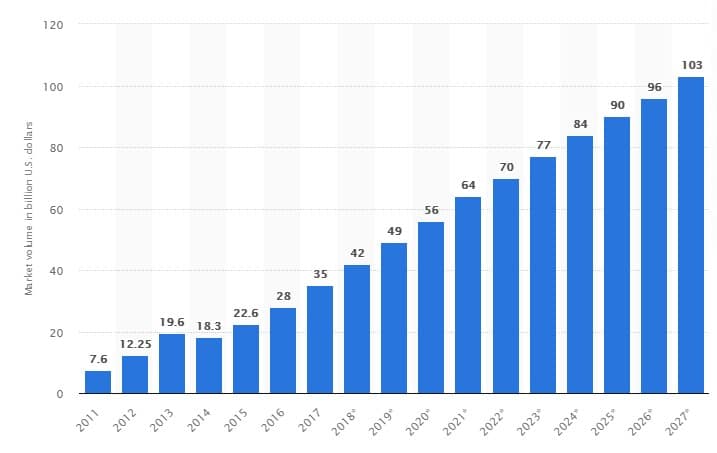Outsourcing Data Science to Ukraine: 8 Do’s and Don’ts
Get to know why Ukraine is one of the most attractive countries for outsourcing data science services.

Table of Contents
Years ago, scientific researchers gathered and analyzed data by hand. There wasn’t a lot of the data itself, and the most of it was structured. Scientists kept track of their data in notebooks and tables, and, in order to prove that their experiments had significant results, inserted that data into statistical formulas and crunched the numbers to their advantage.
Computers changed it all. As software began to gather more and more data, the data itself became more unstructured. Out of the need to keep track of all of this raw material, data science was born.
Researchers and statisticians, in conjunction with IT specialists, realized that they could gather and analyze large amounts of data from a lot of different places to gain insights and make predictions. The concept of “Big Data” followed suit.
This has allowed the scientific community to conduct research faster and, because of the sheer volumes collected, to be more accurate, and to allow for better predictions and solutions. Still, Big Data isn’t suited solely for science.
Table of Contents
Big Data Use Cases For Businesses
There is a growing number of business enterprises that take a data-driven approach to make decisions and find solutions to improve their performance. And, consequently, increase their revenue and profit.
The ability to digitally gather and analyse large amounts of data from multiple sources allows companies to improve their effectiveness, predict customer behavior, and gain a competitive edge over others in their niche. And while the current software development scene includes machine learning and artificial intelligence (AI), big data collection and analysis became a new, highly-demanded IT niche. Data experts, also known as data scientists, are the people who are behind all of these tasks.
Think about it. If you have been in business for over 5 years, and you can take all of your customer information – demographics, purchasing behaviors and patterns, price points, etc. – and have that information analyzed so that it spits out conclusions about what you should do to gain and maintain a larger customer base, how valuable would that be? In fact, we’ve recently published a detailed case study outlining how e-commerce companies can increase revenue using Machine Learning solutions.
This is, on a smaller scale, exactly what big data analytics can do for you. And it’s probably already doing it for your competitors.
Data analytics, in fact, have become so popular that, during 2017, the big data market demand will grow to $33.5 billion in revenue for data science professionals. And it will only grow exponentially from there. Here are the predictions of big data market revenue for the next decade:

Image source: Statista
Trouble For the Big Data Science Environment
The problem for businesses is that Data scientists come at high cost, and it is only the “big boys” who can afford to hire such specialists full-time. Add to this the prediction that, in the U.S. alone, there will be a shortage of data scientists in the range of 1.5 million. And lots of businesses will be forced to outsource to fulfill their data science needs. One of the primary sources for data analytics outsourcing is Eastern Europe, specifically – Ukraine.
So, let’s take a deep look at the reasons why Ukraine is so popular and then consider the Do’s and Don’ts while selecting a data science consulting firm in the Eastern Europe region.
How data science works
Data science is a blend of tools, algorithms and principles that all work towards gaining valuable insight in the immense volumes of data produced. Data scientists are skillful professionals, who are trained in spotting patterns and correlations in data they are working with, as well as they are skillful in communicating the newfound results to their non-scientific colleagues.
There are five stages in the data science lifecycle:
- Capture – data acquisition, data entry, signal reception, data extraction
- Maintain – data warehousing, data cleansing, data staging, data processing, data architecture
- Process – data mining, clustering/classification, data modeling, data summarization)
- Analyze – exploratory/confirmatory, predictive analysis, regression, text mining, qualitative analysis)
- Communicate – data reporting, data visualization, business intelligence, decision making
Data science is an immense promising new niche in the IT industry that is only going to gain traction as the years go on.
Popularity of Data Science Outsourcing to Ukraine – Facts and Benefits
To begin with, why choose Ukraine? The answer is simple – because it is one of the hottest spots for data science consulting in the world. For starters, consider these facts:
- A rapidly growing community of data scientists has been organized by Data-Science UA. Its goal is to make Ukraine the global hub for data science outsourcing services. Today, they organize coursework, workshops, meetings and more so that IT engineers can move into this field under mentorship or some of the best in the business.
- The Science and Technology Center of Ukraine focuses on nurturing technology professionals, and supports a large data science program.
- The Ukrainian Catholic University now offers a Master’s program with a specialty in data science.
- Ukraine is already known for its IT expertise in developing the highest quality software. Ukraine’s companies have moved into data science with passion and are providing training and development to their staff through R&D centers that have popped up all over the country.
- Ukraine’s reputation for IT expertise in software development, AI, and now data science is as good as it gets. As reported by Kyiv Post, in a series of articles, in 2015 alone, revenue from data science outsourcing services in Ukraine reached $2.5 billion. Figures from 2016 are expected to be at least double that. In addition to that, several Ukrainian IT startups competed in the January, 2017 CES show in Las Vegas, and a co-founder of GitLab is now listed in the Forbes 30-under-30 success list.
- Several Ukrainian software development providers have moved into data science outsourcing services by employing full staff of Ukrainian data science professionals. Romexsoft is on board too and we are offering on-demand data science services to our clients.
- Ukrainian IT professionals are, as a group, experts in Java and Apache Spark – perfect combination for data science consulting.
- While deciding on working with Ukrainian IT outsourcing companies, most western countries prefer them because, according to Dou.ua, almost 80% of IT and data science professionals speak fluent English.
- One of the biggest benefits of outsourcing data science to Ukrainian IT companies, of course, is its cost. With the same level of expertise as their Western counterparts, Ukrainian data scientists cost far less. According to StatisticBrain, in fact, of all countries to which the West outsources services, Ukraine’s cost index is 6.3 on a 10-point scale. And given that 43% of all U.S. companies outsource IT services, from the purchase of software products to customized development services, big data outsourcing is a natural extension of already-formed relationships with firms and their developers.
Choosing a Data Science Consulting Firm – Do’s and Don’ts
There are a number of Eastern European companies now offering to consult in the data science industry. If you are considering potential partners for your BDaaS (Big Data as a Service) projects, here are your do’s and don’ts:
The Do’s
1. Do Your Due Diligence
Ask the important questions:
- What are the background and experience of the team that will provide your big data service?
- Will you have a dedicated qualified team specifically assigned to your partnership? You don’t want to have to develop new relationships with new people along the way.
- How long has the company been in business and what references can they give you to check out? (and do check them out!)
- What experience does the firm have in your industry niche?
- Ask for a detailed proposal based upon your goals for data gathering and analysis. Do you want predictions of customer behaviors? Do you want analysis that will suggest new products/services? Do you want a predictive analysis of fraud and/or risk? Identify these before any discussion, and listen to what they say. Be wary of huge promises made without enough information from you.
- Do they work with all types of data storage systems, and specifically yours?
2. Think in Terms of “Testing”
Before you launch into a comprehensive, long-term contract with legal and financial obligations, divide your gathering and analysis goals. Start with delegating just one of those, and see how the outsourcer performs. If you are pleased, then obviously, you can move forward on a larger scope.
3. Be Totally Open
Just like you should never lie to your lawyer, you must be totally open with your outsource provider while discussing your goals and needs. If your enterprise is experiencing declining sales, decreased revenues, etc. – be honest about it. A professional consulting team can then recommend the specific data to aggregate and analyze based on those issues. You can later compare their recommendations with those of other firms you are considering.
4. Involve Members of Your Team
It’s a huge mistake to ignore your sales department, for example, if you are going to use big data analytics to alter their work environments and the methods by which they operate. The same goes for your customer support department. If analyses will alter their operations, they need to be involved. In addition, they may know better what questions to ask.
The Don’ts
1. Don’t Be Looking for a Magic Bullet
Data science is a process. Data needs to be aggregated, then analyzed; recommendations and suggestions should be made. The outcomes are then tested through implementation. More data is gathered and analyzed; recommendations and suggestions may be altered or tweaked as a result. You may be pleased with the results of the initial recommendations, but do not stop there. If you want continued growth in sales, for example, there should be points down the road where data gathering and analysis are to be done again.
2. Don’t Outsource to a Firm That Just Aggregates
There is no value in just gathering and aggregating data. There are tools that allow you to do this yourself. What you are looking for is a team of consultants who can dig deep, interpret that data, discuss the meaning of it in terms you can understand, and make recommendations and suggestions they can justify.
3. Don’t Give Away the “Whole Farm”
When you are giving access to your data, there is a joint responsibility between you and your partner outsourcer to keep that data secure. Don’t ever deliver data to a firm that has not explained to you exactly how it is going to be protected. In fact, you can protect some of your data yourself, for example, by changing the actual customer names to assigned IDs, and only after signing the NDA(Non-disclosure Agreement), opening access to complete records.
4. Don’t Sit Back and Wait
The whole idea of a “partnership” is that there is mutual participation in place. Stay involved in the process as it moves along; get regular updates and reportings. A reputable firm will insist upon this anyway. If you are not involved in the process, you can’t make effective decisions about how far you want the analyses to go and how you can develop a timeline for adopting the recommendations.
Remember This
You are running a business. You are not a data scientist, nor do you want to be. What you want are qualified data professionals who can gather, synthesize, and analyze the data you have. You want consultants who can explain their actions and suggestions in simple enough wording for you to understand.
Have a conversation with Romexsoft, let us hear you out, and then explain to you how our data science teams will be able to meet your goals and fulfill your needs.








